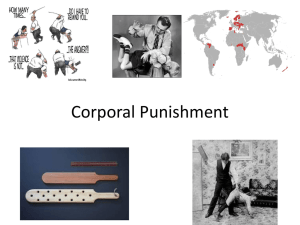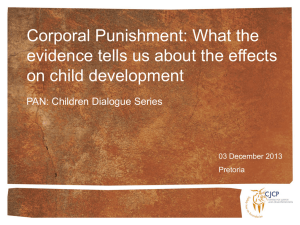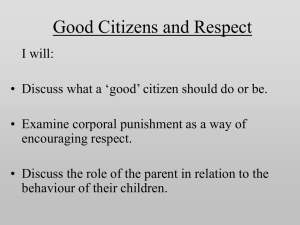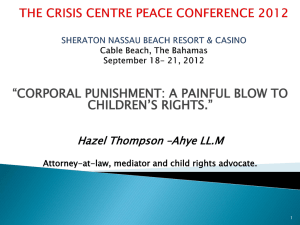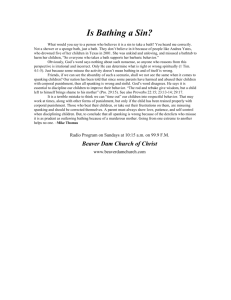printable Word doc for France
advertisement
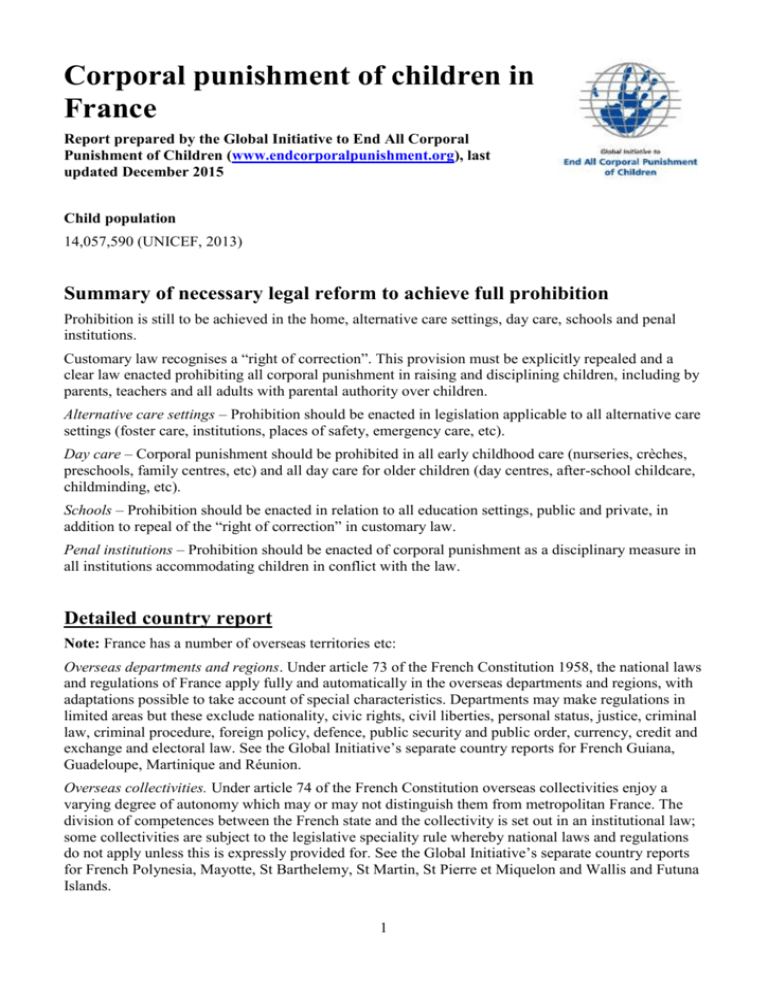
Corporal punishment of children in France Report prepared by the Global Initiative to End All Corporal Punishment of Children (www.endcorporalpunishment.org), last updated December 2015 Child population 14,057,590 (UNICEF, 2013) Summary of necessary legal reform to achieve full prohibition Prohibition is still to be achieved in the home, alternative care settings, day care, schools and penal institutions. Customary law recognises a “right of correction”. This provision must be explicitly repealed and a clear law enacted prohibiting all corporal punishment in raising and disciplining children, including by parents, teachers and all adults with parental authority over children. Alternative care settings – Prohibition should be enacted in legislation applicable to all alternative care settings (foster care, institutions, places of safety, emergency care, etc). Day care – Corporal punishment should be prohibited in all early childhood care (nurseries, crèches, preschools, family centres, etc) and all day care for older children (day centres, after-school childcare, childminding, etc). Schools – Prohibition should be enacted in relation to all education settings, public and private, in addition to repeal of the “right of correction” in customary law. Penal institutions – Prohibition should be enacted of corporal punishment as a disciplinary measure in all institutions accommodating children in conflict with the law. Detailed country report Note: France has a number of overseas territories etc: Overseas departments and regions. Under article 73 of the French Constitution 1958, the national laws and regulations of France apply fully and automatically in the overseas departments and regions, with adaptations possible to take account of special characteristics. Departments may make regulations in limited areas but these exclude nationality, civic rights, civil liberties, personal status, justice, criminal law, criminal procedure, foreign policy, defence, public security and public order, currency, credit and exchange and electoral law. See the Global Initiative’s separate country reports for French Guiana, Guadeloupe, Martinique and Réunion. Overseas collectivities. Under article 74 of the French Constitution overseas collectivities enjoy a varying degree of autonomy which may or may not distinguish them from metropolitan France. The division of competences between the French state and the collectivity is set out in an institutional law; some collectivities are subject to the legislative speciality rule whereby national laws and regulations do not apply unless this is expressly provided for. See the Global Initiative’s separate country reports for French Polynesia, Mayotte, St Barthelemy, St Martin, St Pierre et Miquelon and Wallis and Futuna Islands. 1 New Caledonia. Under articles 76 and 77 of the French Constitution, New Caledonia constitutes a distinct category; it is governed by the legislative speciality rule (see above). See the Global Initiative’s separate country report for New Caledonia. Current legality of corporal punishment Home Corporal punishment is lawful in the home under the “right of correction” in customary law. For example, in 1819 the Supreme Court ruled that parents have this right;1 a ruling in 1967 stated that this right does not apply when the child’s health is placed at risk.2 Provisions against violence and abuse in the Criminal Code 1994, the Civil Code, Act No. 2007-293 reforming child welfare and Act No. 2006399 concerning domestic violence and violence against children are not interpreted as prohibiting all corporal punishment, without exception, in childrearing. In 2013, a complaint was brought against France by the Association for the Protection of All Children (APPROACH) Ltd, under the collective complaints procedure of the European Committee of Social Rights.3 The complaint alleged that, in breach of the European Social Charter, there is no explicit and effective prohibition of all corporal punishment in the family, schools and other settings and that France has failed to act with due diligence to eliminate such punishment in practice. The complaint was registered by the Committee in February 2013; it was declared admissible on 2 July 2013. The Committee published its decision in March 2015. It found that the situation in France is in violation of article 17 of the Charter because “there is no sufficiently clear, binding and precise prohibition of corporal punishment set out in French law”.4 In May 2013, France accepted the recommendations to prohibit corporal punishment of children in all settings made during the UPR earlier in 2013.5 A draft amendment to a new Family Law which would prohibit all corporal punishment by persons with parental authority was under discussion in 2014 but failed to progress through Parliament. In November 2014, Minister for Families Laurence Rossignol called for renewed debate on corporal punishment in the home and schools.6 A proposed draft law on child protection is under discussion but as at October 2015 it appears not to include prohibition of corporal punishment.7 In its first report to the UN Committee on the Rights of the Child, the Office of the Defender of Rights, an independent constitutional authority, confirmed that many parents consider smacking and slapping children “harmless” and “a means of educating them”, and that such acts are “only punishable if their nature and consequences go beyond the limits of the ‘right to correct’”.8 The report calls for prohibition in all settings, including the home. Alternative care settings Corporal punishment is lawful in alternative care settings under the customary “right of correction”. 1 Court de Cassation, Criminal Chamber, 17 December 1819, S. 1819-1821, chron., p. 152 Cour de Cassation, Criminal Chamber, 21 February 1967, Bull. Crim., No. 73 3 Collective complaint No. 92/2013, Association for the Protection of All Children (APPROACH) Ltd v France 4 Collective Complaint No. 92/2013, Association for the Protection of All Children (Approach) v France, Decision on the Merits, Adoption 12 September 2014, Notification 3 November 2014, Publicity 4 March 2015, para. 37 5 28 May 2013, A/HRC/23/3/Add.1, Report of the working group: Addendum, para. 10 6 Reported in The Local, 19 November 2014, http://www.thelocal.fr/20141119/minister-calls-for-new-debate-overspanking-in-france, accessed 4 December 2014 7 http://www.senat.fr/dossier-legislatif/ppl13-799.html, accessed 5 October 2015 8 Report by the Defender of Rights to the United Nations Committee on the Rights of Children – February 27, 2015, para. 48 2 2 Day care Corporal punishment is lawful in day care under the customary “right of correction”. In 2003 the Supreme Court confirmed that nannies and babysitters have this right. Schools Ministerial circulars state that corporal punishment should not be used in schools9 but there is no explicit prohibition in law and “light correction” is tolerated in the same way as it is for parents. In 1908, the Supreme Court confirmed that teachers have a “right of correction”;10 a ruling in 2000 stated that this did not apply to habitual and “non-educational” corporal punishment.11 A 2002 case found that a teacher did not have the right to habitually pull pupils’ hair, kick their behinds and slap their faces but did not rule out all corporal punishment.12 According to the national report to the European Committee of Social Rights in 2010, judicial decisions have acknowledged the “right of correction” by parents, teachers and educators and laid down the conditions that it must be (i) harmless, (ii) of moderate intensity (slaps, clothes seized, ears and hair pulled) and (iii) aimed at maintaining school order and discipline.13 In response to the collective complaint against France made to the European Committee of Social Rights in 2013 (see under “Home”, above), the Government referred to Circular No. 91-124 of 6 June 1991 (amended 1992 and 1994) which states that in primary school “all corporal punishment is strictly prohibited” (s3.2.2) and to Circular No. 2011-111 of 1 August 2011 on disciplinary measures in secondary schools which makes no provision for corporal punishment. According to the Education Code, the internal regulations of schools must be based on these circulars. The Government also reported that the Criminal Chamber no longer refers to a “right to smack” of parents and teachers. As noted above (see under “Home”), the Committee concluded that there was no clear prohibition of corporal punishment in French law. Penal institutions Corporal punishment is considered unlawful as a disciplinary measure in penal institutions, but there is no explicit prohibition in legislation. The Code of Criminal Procedure 1994 provides for respect for human dignity (art. D.189) and prohibits violence towards detainees (art. D.220). A decree of 4 April 1996 and its implementing circular of 12 April 1996 prohibit cruel, inhuman or degrading punishment. Sentence for crime Corporal punishment is unlawful as a sentence for crime. There is no provision for judicial corporal punishment in criminal law. 9 Circular No. 91-124 of 6 June 1991 regarding primary schools and Circular No. 2000-105 of 11 July 2000 for secondary schools 10 Cour de Cassation, Criminal Chamber, 4 December 1908, Bull. Crim., No. 482 11 Court of Appeal, Nancy, 17th January 2000 12 Cour de Cassation, Criminal Chamber, November 26 2002, case n° 02-81727 13 16 December 2010, RAP/RCha/FR/X(2010), pp. 54-55 3 Universal Periodic Review of France’s human rights record France was examined in the first cycle of the Universal Periodic Review in 2008 (session 2). No recommendations were made concerning corporal punishment of children. Review in the second cycle took place in 2013 (session 15). The following recommendations were made:14 “Take all the necessary legal measures to explicitly ban the corporal punishment of children in all settings, including the family, schools and institutions (Uruguay); “Introduce legislation to explicitly prohibit all corporal punishment of children as recommended by the Committee on the Rights of the Child (Finland); “Consider introducing provisions explicitly prohibiting corporal punishment against children (Poland)” The Government accepted the recommendations.15 Recommendations by human rights treaty bodies Committee on the Rights of the Child (22 June 2009, CRC/C/FRA/CO/4, Concluding observations on third/fourth report, paras. 6, 57 and 58) “The Committee regrets that some of the concerns and recommendations it made upon consideration of the second periodic report have been insufficiently addressed, particularly those relating to … corporal punishment…. “While taking note of the assertion by the State party that all forms of physical corporal punishment are prohibited in the French Penal Code, the Committee reiterates its concern that corporal punishment, in particular in the home, as well as in schools, remains widespread, especially in the Overseas Departments and Territories, and that a specific provision to prohibit explicitly corporal punishment against children is still missing. “Reiterating its previous recommendation and in accordance with its general comment No. 8 (2006), the Committee recommends that the State party explicitly prohibit corporal punishment in all settings, including in the family, in schools, in institutions and other childcare settings, increase awarenessraising in this respect and promote the value of education without violence according to article 28, paragraph 2, of the Convention. In this endeavour, the Committee further recommends that the State party follow-up on the campaign of the Council of Europe to achieve full prohibition of all forms of corporal punishment which it has signed up for.” Committee on the Rights of the Child (30 June 2004, CRC/C/15/Add.240, Concluding observations on second report, paras. 38 and 39) “The Committee welcomes the fact that the State party considers corporal punishment totally unacceptable and inadmissible, however it remains concerned that corporal punishment is not explicitly prohibited in the family, in schools, in institutions and in other childcare settings. “The Committee encourages the State party to expressly prohibit corporal punishment by law in the family, in schools, in institutions and in other childcare settings. It further recommends awareness14 15 21 March 2013, A/HRC/23/3, Report of the working group, paras. 120(116), 120(117) and 120(118) 28 May 2013, A/HRC/23/3/Add.1, Report of the working group: Addendum, para. 10 4 raising and promotion of positive, non-violent forms of discipline, especially in families, schools and care institutions in light of article 28, paragraph 2, of the Convention.” Committee on the Rights of the Child (25 April 1994, CRC/C/15/Add.20, Concluding observations on initial report, para. 24) “The Committee would also like to suggest that further awareness-raising and educational measures be undertaken to prevent child abuse and the physical punishment of children.” European Committee of Social Rights (January 2012, Conclusions 2011) “In its previous conclusion (Conclusions 2005) the Committee held that the situation was not in conformity with the Charter as all forms of corporal punishment of children were not prohibited. In this connection the Committee notes from the report of the Governmental Committee to the Committee of Ministers (TS-G (2005) 25, §78) that there is no specific prohibition of corporal punishment but under the Criminal Code any act of violence is prohibited. The French authorities consider that there is no need for further legislation. “In its previous conclusion the Committee asked what were the implications of the 2000 judicial ruling which stated that corporal punishment which is repetitive and not educational is not covered by the ‘right to correction’ for teachers and for parents. According to the report some judicial decisions in fact acknowledged the use of ‘right of correction’ by parents, teachers and educators, provided that it is harmless, moderate (spank, clothes seized, ears and hair pulled) and aims at maintaining school order and discipline. However, if the objective is to humiliate the student, if the correction causes physical damage or if it is too degrading, courts tend to convict the adult. “The Committee notes from another source that a survey by the Union of Families in Europe (UFE) of 2,000 grandparents, parents and children found that 96% of children have been smacked; 84% of grandparents and 87% of parents have administered the corporal punishment. One in ten parents admitted to punishing their children with a ‘martinet’ (a small whip); 30% of children said they had been punished with a martinet. Corporal punishment is lawful in alternative care settings under the customary ‘right of correction’. In 2003 the Court of Cassation confirmed that nannies and babysitters have this right. “According to the report a draft law to include the prohibition of corporal punishment, including spanking, in the Civil Code has been brought to the National Assembly in 2010. The Committee wishes to be informed about the outcome. “The Committee recalls that to comply with Article 17 with respect to the corporal punishment of children, States’ domestic law must prohibit and penalise all forms of violence against children, that is acts or behaviour likely to affect the physical integrity, dignity, development or psychological well being of children. The relevant provisions must be sufficiently clear, binding and precise, so as to preclude the courts from refusing to apply them to violence against children. Moreover, States must act with due diligence to ensure that such violence is eliminated in practice. “The Committee holds that there has been no change to the situation which it has previously found not to be in conformity with the Charter. Therefore it reiterates its previous finding of non-conformity on this ground.… “The Committee concludes that the situation in France is not in conformity with Article 17§1 of the Charter on the grounds that: - all forms of corporal punishment of children are not prohibited….” 5 European Committee of Social Rights (March 2005, Conclusions 2005) “In the previous conclusion the Committee noted that the Penal Code prohibits violence against the person and provides for increased penalties where the victim is under 15 years of age or where the perpetrator is related to the child or has authority over the child, but does not necessarily cover all forms of corporal punishment which it found not to be in conformity with the Revised Charter. The Committee finds no information in the report that the situation has changed. The Committee notes therefore that corporal punishment is not prohibited in the home or in institutions and other childcare settings and that this situation is not in conformity with the Revised Charter. “The Committee notes from another source that High Court ruling of 1889 allowed a ‘right to correction’ for teachers and for parents. A 2000 judicial ruling stated that corporal punishment which is repetitive and not educational is not covered by this right. The Committee asks the next report to explain the implications of the 2000 judicial ruling with regard to the use of corporal punishment in the home. … “The Committee concludes that the situation in France is not in conformity with Article 17.1 of the Revised Charter on the grounds that: - corporal punishment of children is not prohibited….” European Committee of Social Rights (1 October 2003, Conclusions 2003 Vol. 1, page 173) “As regards corporal punishment of children, the Committee notes that according to the report corporal punishment of children is not explicitly prohibited in the home, in school or in other institutions. Although the Penal Code prohibits violence against the person and provides for increased penalties where the victim is under 15 years of age or where the perpetrator is related to the child or has authority over the child. The Committee notes that these provisions of the Penal Code do not necessarily cover all forms of corporal punishment and therefore finds that the situation is not in conformity with the Revised Charter…. “The Committee concludes that the situation in France is not in conformity with Article 17.1 of the Revised Charter as the corporal punishment of children is not prohibited.” European Committee of Social Rights (1 January 2001, Conclusions XV-2 vol. 1, pages 220-225) “The Committee wishes to know whether legislation prohibits all forms of corporal punishment of children, in schools, in institutions, in the home and elsewhere….” Prevalence/attitudinal research in the last ten years A study carried out in 2007 examined five European countries – Sweden, Austria, Germany, France and Spain. Five thousand parents (1,000 in each nation) were interviewed about their use of and attitude towards corporal punishment, their own experiences of violence and their knowledge and beliefs about the law. In France, 72% said they had “mildly” slapped their child on the face, 87% on the bottom; 32% had given their child a “resounding” slap on the face, and 4.5% had beaten their child with an object. Nerly eight per cent (7.9%) never used corporal punishment; 85% agreed that “one 6 should try to use as little corporal punishment as possible”, and 825% agreed that “non-violent childrearing is the ideal”. (Bussmann, K. D. (2009), The Effect of Banning Corporal Punishment in Europe: A Five-Nation Comparison, MartinLuther-Universität Halle-Wittenberg) A survey by the Union of Families in Europe (UFE) of 2,000 grandparents, parents and children found that 95% of adults and 96% of children have been smacked; 84% of grandparents and 87% of parents have administered corporal punishment. One in ten parents admitted to punishing their children with a “martinet” (a small whip); 30% of children said they had been punished with a martinet. When asked the reason for smacking their children, parents said it was part of “bringing up” their children (77%), it was to “relieve their feelings” (7%) or both of these things. When asked how they planned to discipline their own children when they become parents, 64% of children responded “the same”; 61% of grandparents and 53% of parents said they oppose a ban on corporal punishment of children. (Union of Families in Europe (2007), POUR ou CONTRE les fessées?, Tassin: UFE) Report prepared by the Global Initiative to End All Corporal Punishment of Children www.endcorporalpunishment.org; info@endcorporalpunishment.org December 2015 7

